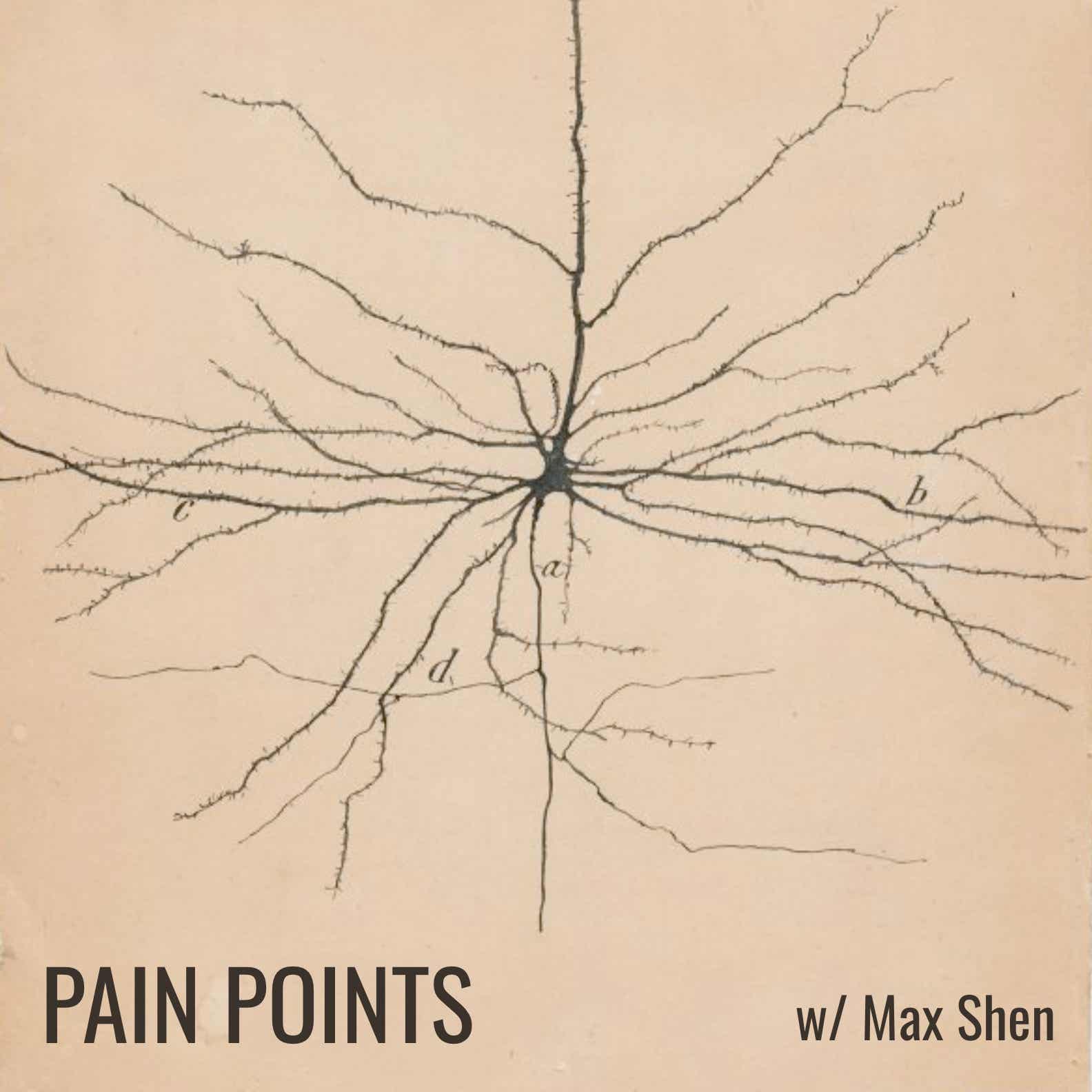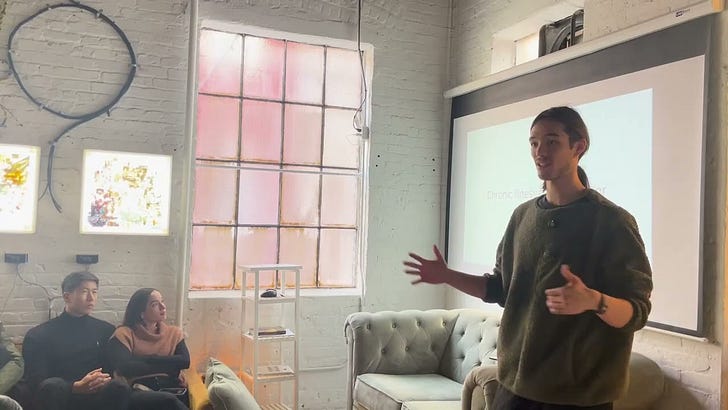Pain Points with Max Shen

Pain Points with Max Shen
Podcast Description
Are you a brain in a body, or a body with a brain? What does the nervous system have to do with chronic pain? How do we 'debug' pain?
Join Max as he explores the relationship between pain and insight. Featuring scientists, pioneers in somatic therapy, and those who have recovered from chronic pain.
Max Shen is a pain researcher affiliated with MIT. He is also the creator of Debug Your Pain, a platform to teach skills in pain resolution.
A production of Debug Your Pain. Read our latest at essays.debugyourpain.com
essays.debugyourpain.com
Podcast Insights
Content Themes
The podcast explores a variety of topics surrounding pain science, somatic therapy, and personal recovery stories. Notable episodes cover themes such as the relationship between pain and cognition, the constraints-led approach in movement coaching, and discussions on biological computation as it relates to health. Specific episode examples include interviews discussing the fallacies of traditional training models in sports and the role of intention in movement.

Are you a brain in a body, or a body with a brain? What does the nervous system have to do with chronic pain? How do we ‘debug’ pain?
Join Max as he explores the relationship between pain and insight. Featuring scientists, pioneers in somatic therapy, and those who have recovered from chronic pain.
Max Shen is a pain researcher affiliated with MIT. He is also the creator of Debug Your Pain, a platform to teach skills in pain resolution.
A production of Debug Your Pain. Read our latest at essays.debugyourpain.com
This past weekend, inspired by a recent preprint from Thomas Pollak, Mike Levin, et al, I gave a talk on how cybernetic models (predictive processing, dynamical systems, homeostasis/allostasis) are a hugely powerful lens to understate the current epidemic of the recent rise in chronic illness.
You can watch the video while looking at the slides here, or read the essay version below:
Here’s the essay version (generated by Claude from my transcript). It is less good than the talk, but faster to read:
Chronic Illness as a Stuck Set Point
In 1910s Vienna, one in five young men had syphilis. The medical community was helpless—a deep nihilism pervaded as they watched patients die from this bacterial infection that would spread across the body with devastating mortality rates.
Then a German psychiatrist noticed something strange: some of his late-stage syphilis patients got better after getting more sick. Specifically, after contracting malaria.
In what seems like utter insanity in hindsight, Julius Wagner-Jauregg began drawing blood from his malaria patients and injecting it into those dying from syphilis. There was even a criminal investigation involved.
But here’s the thing—it worked. Even though 10-15% died from the malaria, a larger fraction survived what was previously a death sentence. Wagner-Jauregg won the Nobel Prize in 1927.
Nobody could explain why it worked. Medical research today still does not have a biomechanistic account. But it clearly worked.
The Wrong Level of Abstraction
This shouldn’t make sense within the biomedical model that dominated (and still dominates) medicine. How do you give someone something that makes them more sick, yet they become better?
The biomedical reasoning is straightforward: diseases have specific causes, specific dysfunctions. Diphtheria —> Kill the bacterium. Clogged arteries —> Widen them. We find and fix the broken part of our biomechanical bodies.
But the malaria example isn’t unique. If you look at long COVID and other post-viral syndromes, there are well-documented cases of secondary infections leading to resolution.
In the case of MDMA trials for PTSD, the drug doesn’t remove some “PTSD toxin” but somehow resets the entire system.
In my own research, we have increasingly hard to ignore evidence about the widespread efficacy of nervous system reprocessing resolving chronic pain.
This is still the dominant approach
In 2021, Congress gave NIH $1.5 billion to research long COVID—all focused on biochemical pathology, systematically excluding researchers studying nervous system approaches.
Bodies as Problem-Solvers
What if we stopped seeing the body as a collection of chemical pathways and started seeing it as a multi-scale collective intelligence solving problems at different layers—from cell to organ to your whole being?
Your body wants to keep you in a range of safe values. Try this experiment—on your next exhale, stop yourself from inhaling. Feel that rising tension, that panic. Your throat tightens, blood vessels dilate, emotional systems activate. That’s the homeostatic impulse, happening across multiple scales simultaneously.
Normally, you breathe at 13-15 breaths per minute. If you start jogging, that set point shifts higher.
If you work a chronically stressful job, your breathing becomes shallow and fast, and paradoxically, tissue oxygen can decrease over time.
The key insight here is that sometimes our bodies get stuck in these maladaptive states.
Try clenching your abs like you’re bracing for impact. Notice how hard it is to breathe? Now relax.
Feel the difference—the ease, the fuller breath, the sense that more of your body is available.
If you walked around with clenched abs all the time (as many do under chronic stress), your breathing would be persistently altered. You might even forget you’re clenching at all.
The Reset Mechanism
Remember when your computer freezes and nothing works except turning it off and on again? That’s the metaphor driving this new understanding of chronic illness.
We already use resets in medicine without calling them that. During a heart attack, emergency responders shock the heart with high voltage—not to teach it the proper rhythm, but to create a perturbation that allows the tissue to recalibrate. Fecal transplants work similarly—overwhelming the sick person’s microbiome with healthy bacteria, then allowing repopulation in better proportions.
Think of it like this: imagine illness and health as valleys in a landscape. In chronic illness, the valley walls are steep—it takes enormous energy to climb out. But during a reset, those valleys flatten temporarily. The body can move between states with less resistance.
Maybe that’s what happened with Wagner-Jauregg’s malaria cure. Maybe that’s what’s happening when a secondary infection resolves long COVID, or when MDMA allows PTSD to lift, or when nervous system work dissolves chronic pain. The perturbation creates a window of plasticity where the system can reconfigure.
What This Changes
This isn’t just semantic reshuffling. If our bodies are intelligent problem-solving systems that can get stuck, then treatment becomes about creating the right conditions for reset—understanding not just the magnitude of perturbation needed, but the context before and after.
The questions now are practical: What variables actually define these states? How does conscious attention affect plasticity? (There’s something here about how becoming aware of your body’s defensive patterns might itself flatten the landscape.) What makes a helpful reset versus a harmful one?
We’re at the beginning of something. The patterns are here for us to explore. And for someone who spent months unable to type, watching my own pain system reset through understanding and careful perturbation, I can tell you—this paradigm shift matters.
In four images:
This is a public episode. If you would like to discuss this with other subscribers or get access to bonus episodes, visit essays.debugyourpain.com

Disclaimer
This podcast’s information is provided for general reference and was obtained from publicly accessible sources. The Podcast Collaborative neither produces nor verifies the content, accuracy, or suitability of this podcast. Views and opinions belong solely to the podcast creators and guests.
For a complete disclaimer, please see our Full Disclaimer on the archive page. The Podcast Collaborative bears no responsibility for the podcast’s themes, language, or overall content. Listener discretion is advised. Read our Terms of Use and Privacy Policy for more details.